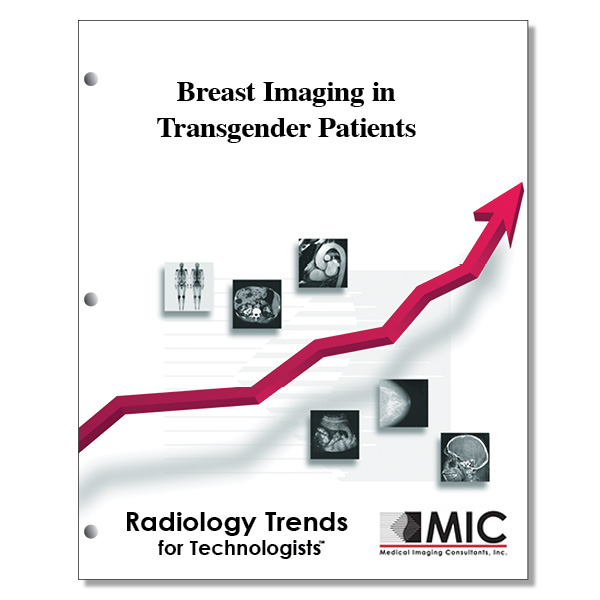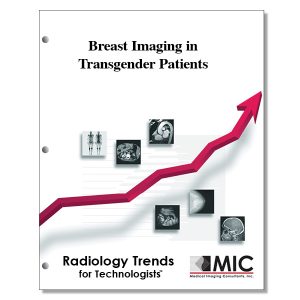

Breast Imaging in Transgender Patients
Appropriate terminology is defined with respect to the transgender population, evidence for breast cancer risk and screening is reviewed, and special considerations and challenges for these individuals are discussed.
Course ID: Q00635 Category: Radiology Trends for Technologists Modality: Mammography2.0 |
Satisfaction Guarantee |
$24.00
- Targeted CE
- Outline
- Objectives
Targeted CE per ARRT’s Discipline, Category, and Subcategory classification:
[Note: Discipline-specific Targeted CE credits may be less than the total Category A credits approved for this course.]
Breast Sonography: 0.75
Patient Care: 0.25
Patient Interactions and Management: 0.25
Procedures: 0.50
Pathology: 0.25
Breast Interventions: 0.25
Computed Tomography: 0.50
Patient Care: 0.25
Patient Interactions and Management: 0.25
Procedures: 0.25
Neck and Chest: 0.25
Mammography: 1.75
Patient Care: 1.50
Patient Interactions and Management: 1.50
Procedures: 0.25
Anatomy, Physiology, and Pathology: 0.25
Magnetic Resonance Imaging: 0.50
Patient Care: 0.25
Patient Interactions and Management: 0.25
Procedures: 0.25
Body: 0.25
Registered Radiologist Assistant: 0.50
Patient Care: 0.25
Patient Management: 0.25
Procedures: 0.25
Thoracic Section: 0.25
Sonography: 0.50
Patient Care: 0.25
Patient Interactions and Management: 0.25
Procedures: 0.25
Superficial Structures and Other Sonographic Procedures: 0.25
Outline
- Introduction
- Terminology and Doctor-Patient Communication
- Transgender Women
- Medical Hormone Treatment
- Hormone Therapy and Breast Cancer Risk
- Screening
- Diagnostic Considerations
- Recall for Diagnostic Workup After Screening
- Palpable Lumps
- Augmentation Considerations
- Transgender Men
- Medical Hormone Treatment
- Surgical Treatment
- Medical and Surgical Therapy and Breast Cancer Risk
- Screening
- Diagnostic Considerations
- Special Considerations and Challenges
- Conclusion
Objectives
Upon completion of this course, students will:
- know proper terminology for transgender individuals
- know proper pronouns to use with transgender individuals
- understand what top surgery means for different patient populations
- realize the clinical effect of gender-affirming hormones
- recognize breast malignancies developed by transgender women
- compare trends in breast cancer between transgender and cisgender women
- know the breast cancer screening guidelines for transgender women with more than 5 years of hormone therapy
- recognize standard patient management for transgender women under various clinical circumstances
- identify the hormone used for inducing masculine changes while minimizing female characteristics
- realize the clinical effects of gender-affirming hormone therapy in the breasts of a transgender man
- know the recommendation for breast cancer screening for a transgender man who has had top surgery
- know the recommendation for breast cancer screening for a transgender man who has not had top surgery
- understand challenges faced by the transgender population causing them to postpone medical care
- identify ways of making the intake form more inclusive for a diverse patient population
- identify ways of making operational policies more inclusive for a diverse patient population
- recognize reasons that transgender patients may have ID cards that do not display the proper name or gender
